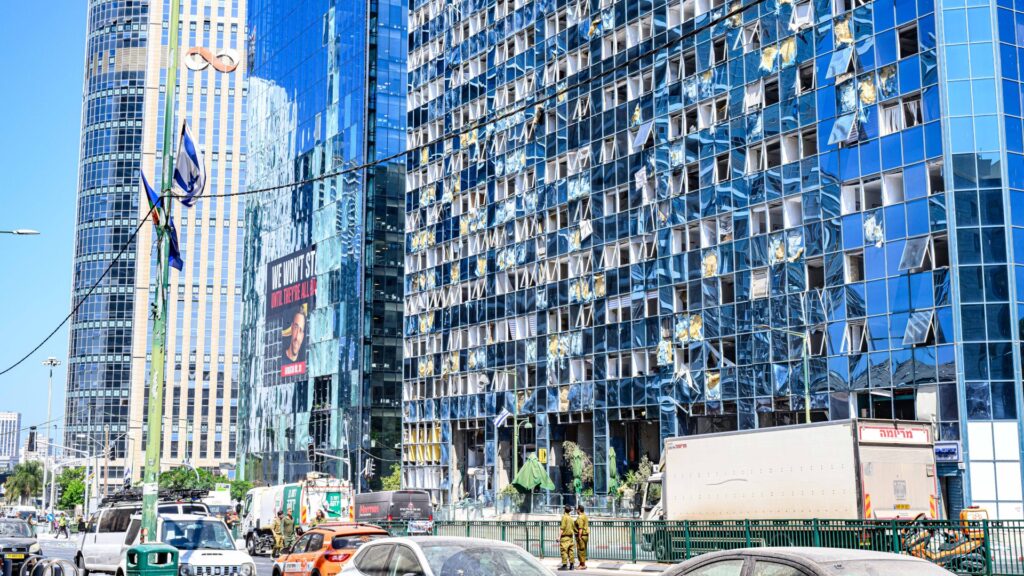Iranian ballistic missile struck several areas of Israel on Thursday, with extensive damage reported at the Israeli stock exchange building in Ramat Gan, Tel Aviv, as well as a major hospital in the south of the country.
Images seen by Middle East Eye showed shattered glass and debris strewn onto the streets outside the stock exchange, the heart of the country’s economy, with damage also reported at several nearby offices and residential buildings.
Meanwhile, unverified footage posted on social media showed people running through corridors of the Soroko Hospital in Beer Sheva as doctors stood outside the wrecked building.
“BREAKING: A direct hit has been reported at Soroka Hospital in Be’er Sheva, southern Israel. More details to follow,” the foreign ministry said in a post on X.
A spokesperson for the hospital reported “damage to the hospital and extensive damage in various areas”.
New MEE newsletter: Jerusalem Dispatch
Sign up to get the latest insights and analysis on
Israel-Palestine, alongside Turkey Unpacked and other MEE newsletters
“We are currently assessing the damage, including injuries. We ask the public not to come to the hospital at this time,” they said.
Iran denied claims that it directly attacked the hospital, saying it launched a “precise and direct” on a nearby Israeli military target.
“The target of attack was the large [Israeli army] Command and Intelligence headquarters and the military intelligence camp in the Gav-Yam Technology Park,” the Iranian state news agency IRNA reported.
Following the attack, Israeli Prime Minister Benjamin Netanyahu vowed to make Iran’s leadership “pay a heavy price”.
The strikes across Israel came hours after Israel’s latest attack on Iran’s sprawling nuclear programme, striking Iran’s Arak heavy water reactor.
Iranian state television reported that there was “no radiation danger whatsoever” and that the facility had been evacuated before the attack.
Since Friday, when Israel launched its assault on Iran, Israel has repeated targeted the country’s military and nuclear facilities, as well as assassinated high-profile security, intelligence and military commanders as well as scientists.
The attacks, which have also targeted residential areas, have killed more 500 people and wounded at least 1,300, many of them civilians.

As Trump weighs bombing Iran’s Fordow, ‘mission creep’ lurks behind US attack
Read More »
In response, Iran has fired barrages of missiles towards Haifa, Tel Aviv and other major Israeli cities, killing dozens.
Hundreds of missiles have been launched since Friday, and whilst Israel’s air defence systems are robust, they have been unable to stop all of them.
Israel’s military censor, as a matter of policy, has barred local and international media outlets from publishing the details of the exact locations targeted.
Earlier this week, the Israeli army said in a statement that the country’s air defences were not fully secure against missile attacks.
Meanwhile, a senior US official familiar told MEE that Israel, along with the US, were exhausting supplies of ballistic missile interceptors, just days into the hostilities with Iran.
US President Donald Trump, who initially distanced himself from the conflict, has increased US military presence in the region and is weighing up ordering attacks on Iran.
Iran’s Supreme Leader, Ayatollah Khamenei, warned on Wednesday that the US would face “irreparable damage” if it shifted from supporting Israel’s defence to an active role in attacking the Islamic Republic.

